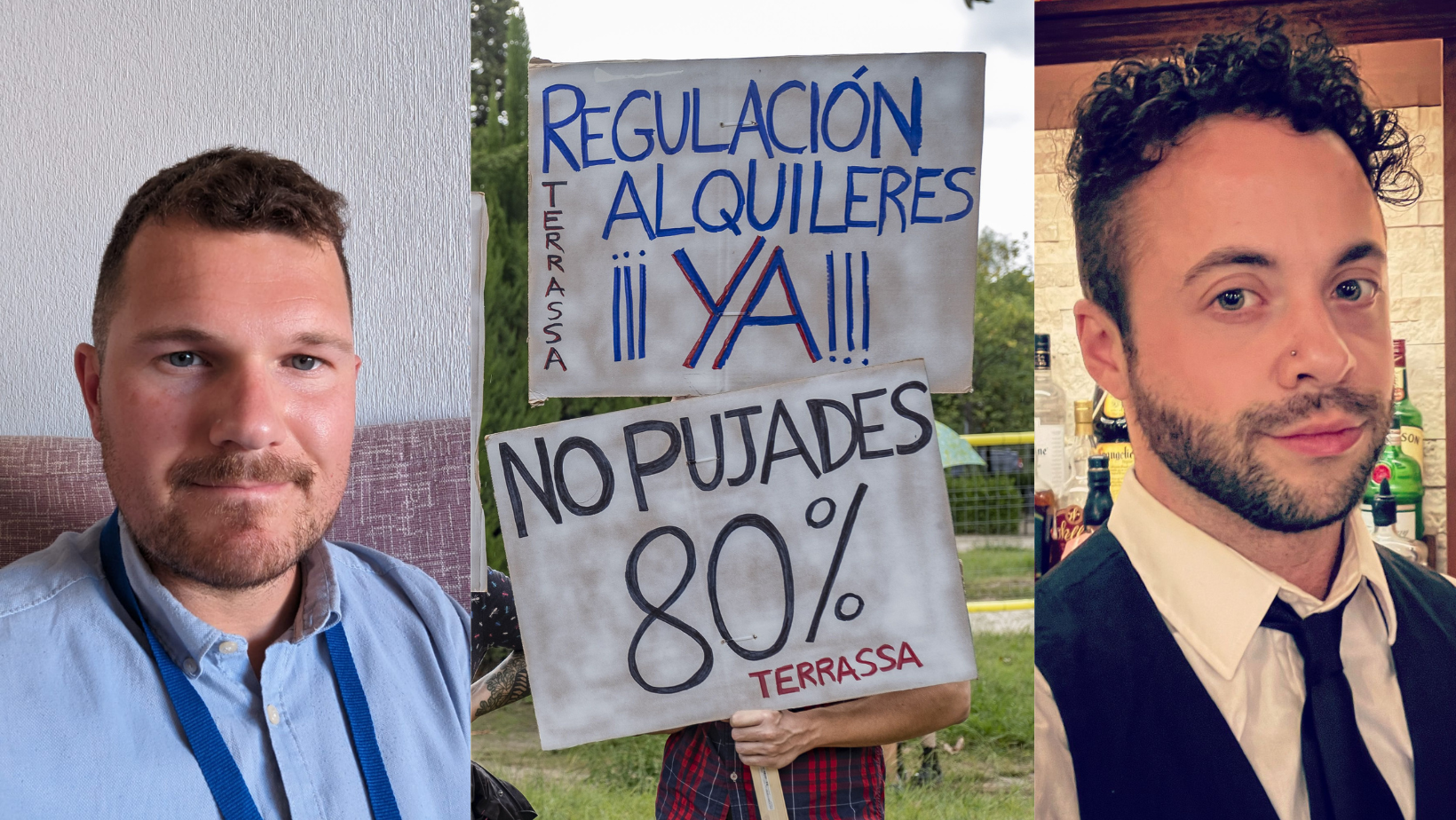AFTER various Olive Press staff fall victim to scams and lawbreakers while looking to rent, Yzabelle Bostyn looks at the ‘perfect storm’ in Spain’s rental market.
Exactly a year ago, the Spanish government introduced its much heralded ‘Ley de Vivienda.’
The new Homes Law aimed to tackle a myriad of problems in the rental market, in particular to increase the amount of affordable homes for the young and vulnerable.
The main measures included a 3% cap on rent rises, additional rent caps in ‘stressed’ areas, and the right to renew contracts for up to five years.

However, despite their good intentions, many of the proposed changes have been ignored around the country.
With the 17 autonomous regions allowed to adapt or dilute the law as they saw fit, it has led to chaos and outright opposition.
The Junta de Andalucia, for example, even took its anger to the Constitutional Court, which has since declared parts of the law unconstitutional.
The pushback around the country has left the rental market under even higher pressure than before, with rents 30% above targets set by regulatory bodies, and social housing on its knees.
According to leading property portal Fotocasa, tenants spent 43% of their salary on rents last year, a five year high.
It’s no surprise that a ‘new class divide’ has developed between renters and landlords, according to a study by the Critical Urban Study Group.
The anger is all too palpable looking at the recent protests against tourism and AirBnB style holiday rentals in cities around the country, including Malaga, Barcelona and Palma.

There has been an angry backlash that has even led to some local protest groups (such as the one in Girona) that are demanding to know where foreigners have lived or bought.
Derogatory stickers have gone up criticising tourists and key locks for AirBnBs have been vandalised.
So where did it all go wrong?
In an attempt to protect tenants, the Ley de Vivienda simply went too far.
The law lacked subtlety and gave too much protection to tenants, including the right to automatically renew long term contracts for up to five years.
It also insisted all agency commission fees fell on the landlord, meaning the tenant no longer needed to pay anything extra to the agency.
“There is so much red tape now that it is counterproductive,” explained Olive Press property expert, Adam Neale, of agency Terra Meridiana (Estepona).

“It has had the opposite effect to what was intended. Landlords simply have no incentive to rent or play by the book due to the risk of bad tenants and squatters.”
He continues: “Landlords would rather sell or develop tourist flats. And there is clearly now an oversupply of tourist lets and an undersupply of living spaces to rent,” he adds.
This high demand and unenforced laws intended to protect tenants leaves them ‘vulnerable to landlords who think they can get away with skirting the law’.
Astronomical prices, scams, dodgy contracts and ‘under the radar’ rentals are rife across the country.
In the last decade, rent has increased 2.3 times more than average incomes (77% vs. 33%), making it increasingly difficult to afford to rent.
“The current prices are ridiculous,” says Christina Ford, an agent at Paraiso Casas in Axarquia, with 15 years experience on the Costa del Sol.
“Although it’s true that costs have gone up for landlords, they are greedy and are still asking too much.”
Many landlords however argue they see renting as a ‘risk’, meaning they try to ‘try to twist and turn’ the law to protect their interests.
Incredibly, it is still legal to operate as an agent without a licence in many parts of Spain, meaning many landlords and agents are ‘unaware’ of the current law.
According to Christina: “Many landlords come to me, but when I ask if they know about the new law I have to show them it.
“Even if they know the law, they will go to multiple agents until they find one willing to break it.”
One of the most common scams landlords and agents take part in is charging tenants agency commission fees.
Once a 50/50 split between landlords and tenants, the Ley de Vivienda made it illegal for tenants to pay agency commission.
However, an Olive Press investigation has revealed it is still common practice to charge tenants the fee.
Half a dozen tenants we interviewed for this article claimed they were asked to pay a commission of a month on top of an advance of two, often many more months, rent.
Damon Schur, a student from Pennsylvania, USA, was charged a €975 ‘agency fee’.
He ‘knew it wasn’t legal’ but claims the system of ‘oneing up other tenants’ by agreeing to pay extra fees forced his hand.
READ MORE: Landlords earn more than DOUBLE their tenants thanks to rising rent prices, figures reveal

Photo: The Olive Press
“It’s just something you have to do,” he said.
Even still, the 32-year-old had to ‘convince’ the agent to let the property to him, paying six months rent upfront plus a two month deposit, both illegal practices.
Overall, this set him back an advance payment of an eye-watering sum of €8,775.
“I had to play the game or I’d be homeless,” he confessed. “Most people know it isn’t right but it’s how it is. It’s a messed up system but I can’t fight it alone. We need to come together.”
According to Ford, it is a ‘Catch 22’ as if the agents don’t ask the tenants for a commision, they ‘risk not getting paid’ as many landlords simply ‘refuse’ to pay the agency fee.
Some agents will even try to charge a fee each year a tenant is in the property.
Oliver Reynolds, 32, was told he would need to pay an extra €900 to stay in his Marbella flat for another year.
“They told me it was just to change the date on the contract,” he told the Olive Press.
READ MORE: Catalunya cracks down on landlord ‘loophole’ amid surging prices – all you need to know

Photo: The Olive Press
When he pointed out that this was illegal, the agent told him it was ‘just how they do business’.
The maths teacher at an international school said: “It’s harsh and not a very nice way to treat normal working people.”
Now, he is looking for another flat but ‘keeps coming up against’ other common practices such as being offered an 11-month contract to circumvent the new laws.
A year contract would automatically renew for a year and under the new law long-term rental agreements, tenants have the right to automatically renew for up to five years.
They also get offered a priority if the property is put up for sale.
However, many agents use an 11-month term, which they wrongly define as ‘short’, to convince tenants they do not have the right to renew or have a priority to buy.
“This is the typical fraud that landlords use to try and avoid the law,” said Arturo Lopez of property lawyers, Lopez Legal.

Photo: Lopez Legal
“But if someone is intending to use a property as their permanent place of residence, this is defined as long-term and the tenant has all the corresponding rights.
“There is a 95% chance that the judge overrides these contracts.”
Similarly, the Olive Press spoke to multiple tenants whose landlords tried to kick them out ‘in order to raise rents’.
Not only does the Ley de Vivienda allow tenants to stay in properties for five years, but also restricted rent increases to 3% every year.
Jean Yves, a 65-year-old French expat, was living in his Calanova home (Mijas) with his wife and daughter for 18 months when his ‘nasty’ landlord told them to move out.
She ‘aggressively’ claimed she needed the property for personal reasons, a legitimate way to remove long-term tenants from a property.
However, because the property is under a business licence this was not legally valid.
“It has put my family under a lot of stress, but why should we move out, just for her to increase the rent here and end up paying more elsewhere?”
Meanwhile, a British businessman, who has been renting for three years in San Pedro de Alcantara, was told by his landlady that she ‘needed’ the property for her son to live in, even though he owns three other properties of his own.
“This is the oldest trick in the book, claiming that they have family members who have nowhere to live,” he explained, asking to remain anonymous.
“They come pleading at first and then start demanding you will need to move out.
“It happened to me in a previous home in Casares and the bottom line is most of the time they have no intention of moving a son or daughter in, but just rent for a higher price.”
He continued: “My advice is stay firm and insist you won’t move as they will have to go to a court to prove they are not lying.”
According to property expert, Arturo: “All these issues must be reported.
“‘However, imagine you are a desperate tenant being treated in this way, they ask you subtly, now what? Do you go to the police? I seriously doubt it would be considered a crime.”
Despite the ‘good ideas’ behind the Ley de Vivienda, it seems there is no infrastructure in practice to protect tenants and ensure a fair, equitable market.
As long as the regions are ignoring the laws and fudging things, little is likely to change.
So far, only Catalunya has welcomed the Ley de Vivienda with open arms while Andalucia has challenged it in court.
As tensions rise over rent prices, rising demand, prolific scams and the oversupply of tourist lets, we begin to wonder, will the law survive until this time next year?
READ MORE: Squatter fears in southern Spain see ‘for sale’ and ‘for rent’ signs taken down outside empty homes











